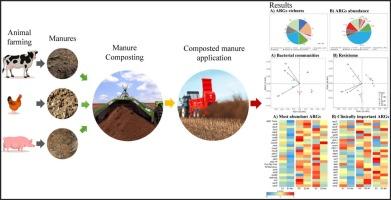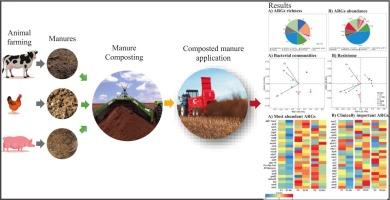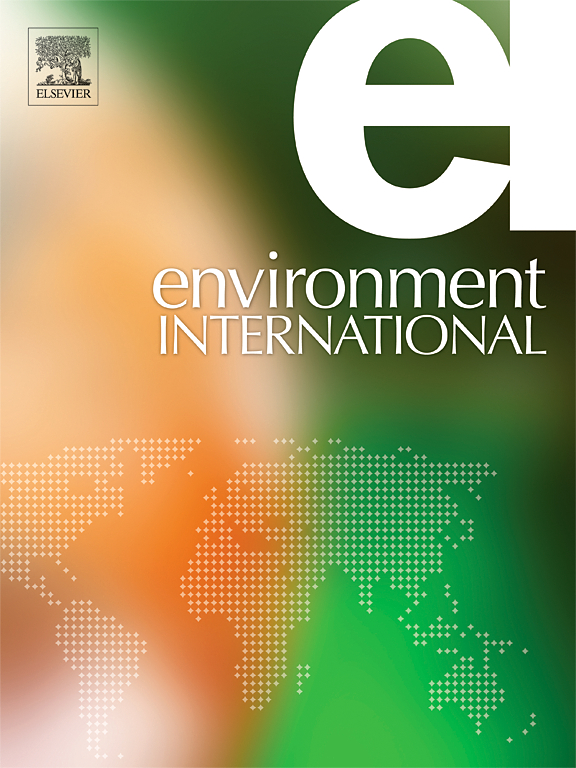Complex interplay between composted manure application, metal contamination, and antibiotic resistance genes profile under tropical field conditions
IF 9.7
1区 环境科学与生态学
Q1 ENVIRONMENTAL SCIENCES
引用次数: 0
Abstract
Manure applications in agricultural soils are a major driver of antibiotic resistance gene (ARG) dissemination, yet long-term effects of composted manure applications under tropical real field conditions remain unclear. This study assessed how successive composted manure applications influence soil physicochemical attributes, bacteriome and resistome profiles in the Brazilian Cerrado, including one site with naturally high heavy metal content. Across all sites, multidrug resistance genes were most abundant, followed by macrolide-lincosamide-streptogramin (MLS), tetracycline, β-lactam and glycopeptides resistance, aligning with predominance of Actinomycetota and Pseudomonadota as key ARG hosts. Manure increased soil pH and available phosphorus (P), with pH significantly shaping bacterial communities and pH and P the resistome in uncontaminated sites (2 and 3). However, in the metal-rich site (1), Cu was the dominant driver. Manure increased ARG richness and changed resistome structure but did not affect clinically relevant genes or resistome diversity. Metal resistance genes (MRGs), particularly for Cu and Zn, strongly influenced resistome dynamics, highlighting co-selection. Integrons integrase genes (intl) abundance increased in metal-depleted but not in metal-rich soils. While composting appears to mitigate ARG spread, particularly for clinically relevant genes, the high antibiotic use in livestock, large manure volumes, and potential for ARG persistence in tropical soils highlight the need for further research on manure treatment strategies and ARG fate in these environments.
Environmental Implication.
Our study highlights the environmental risks of antibiotic resistance gene (ARG) dissemination in tropical agricultural soils, emphasizing the role of manure application and heavy metal contamination in shaping soil resistome. While composted manure increased bacterial diversity and ARG richness, it did not significantly impact clinically relevant genes and resistome diversity, suggesting that composting may help mitigate ARG spread but does not eliminate it. Metals were the dominant drivers of ARG selection in the contaminated site, underscoring the role of co-selection mechanisms in maintaining resistance. However, manure applications increased integrons abundance, raising concerns about horizontal gene transfer and potential ARG proliferation into pathogens. These findings stress the urgent need for improved manure management policies in Brazil, where high antibiotic use in livestock and large manure volumes pose significant environmental and public health risks. Developing sustainable manure treatment strategies and monitoring ARG persistence are essential to limit antibiotic resistance proliferation in tropical agricultural ecosystems.


热带农田条件下堆肥施用、金属污染和抗生素抗性基因谱之间的复杂相互作用
在农业土壤中施用肥料是抗生素抗性基因(ARG)传播的主要驱动因素,但在热带实际田间条件下施用堆肥肥料的长期影响尚不清楚。本研究评估了连续施用堆肥粪肥对巴西塞拉多(Cerrado)土壤理化属性、细菌组和抗性组分布的影响,包括一个天然重金属含量高的地点。在所有位点中,多药耐药基因最为丰富,其次是大环内酯- lincosamde -streptogramin (MLS)耐药基因、四环素耐药基因、β-内酰胺耐药基因和糖肽类耐药基因,这与放线菌和假单胞菌作为ARG主要宿主的优势一致。粪肥增加了土壤pH和有效磷(P), pH显著影响细菌群落,pH和P显著影响未污染地点的抗性组(2和3)。而在富金属位点(1),Cu是主要驱动因子。粪便增加了ARG丰富度,改变了抗性组结构,但不影响临床相关基因或抗性组多样性。金属抗性基因(MRGs),特别是铜和锌的抗性基因,强烈影响抗性组动力学,突出了共选择。整合子整合酶基因(intl)丰度在缺金属土壤中增加,而在富金属土壤中没有增加。虽然堆肥似乎可以减轻ARG的传播,特别是对于临床相关基因,但牲畜中抗生素的大量使用,大量粪便以及ARG在热带土壤中持续存在的可能性突出了对这些环境中粪便处理策略和ARG命运的进一步研究的必要性。环境暗示。我们的研究强调了抗生素抗性基因(ARG)在热带农业土壤中传播的环境风险,强调了肥料施用和重金属污染在形成土壤抗性组中的作用。虽然堆肥增加了细菌多样性和ARG丰富度,但对临床相关基因和抗性组多样性没有显著影响,这表明堆肥可能有助于减轻ARG的传播,但不能消除它。金属是污染部位ARG选择的主要驱动因素,强调了共同选择机制在维持抗性中的作用。然而,施用肥料增加了整合子的丰度,引起了人们对水平基因转移和潜在的ARG向病原体扩散的担忧。这些发现强调了巴西迫切需要改善粪便管理政策,在巴西,牲畜中抗生素的大量使用和大量粪便构成了重大的环境和公共卫生风险。制定可持续的粪肥处理策略和监测ARG的持久性对于限制热带农业生态系统中抗生素耐药性的扩散至关重要。
本文章由计算机程序翻译,如有差异,请以英文原文为准。
求助全文
约1分钟内获得全文
求助全文
来源期刊

Environment International
环境科学-环境科学
CiteScore
21.90
自引率
3.40%
发文量
734
审稿时长
2.8 months
期刊介绍:
Environmental Health publishes manuscripts focusing on critical aspects of environmental and occupational medicine, including studies in toxicology and epidemiology, to illuminate the human health implications of exposure to environmental hazards. The journal adopts an open-access model and practices open peer review.
It caters to scientists and practitioners across all environmental science domains, directly or indirectly impacting human health and well-being. With a commitment to enhancing the prevention of environmentally-related health risks, Environmental Health serves as a public health journal for the community and scientists engaged in matters of public health significance concerning the environment.
 求助内容:
求助内容: 应助结果提醒方式:
应助结果提醒方式:


